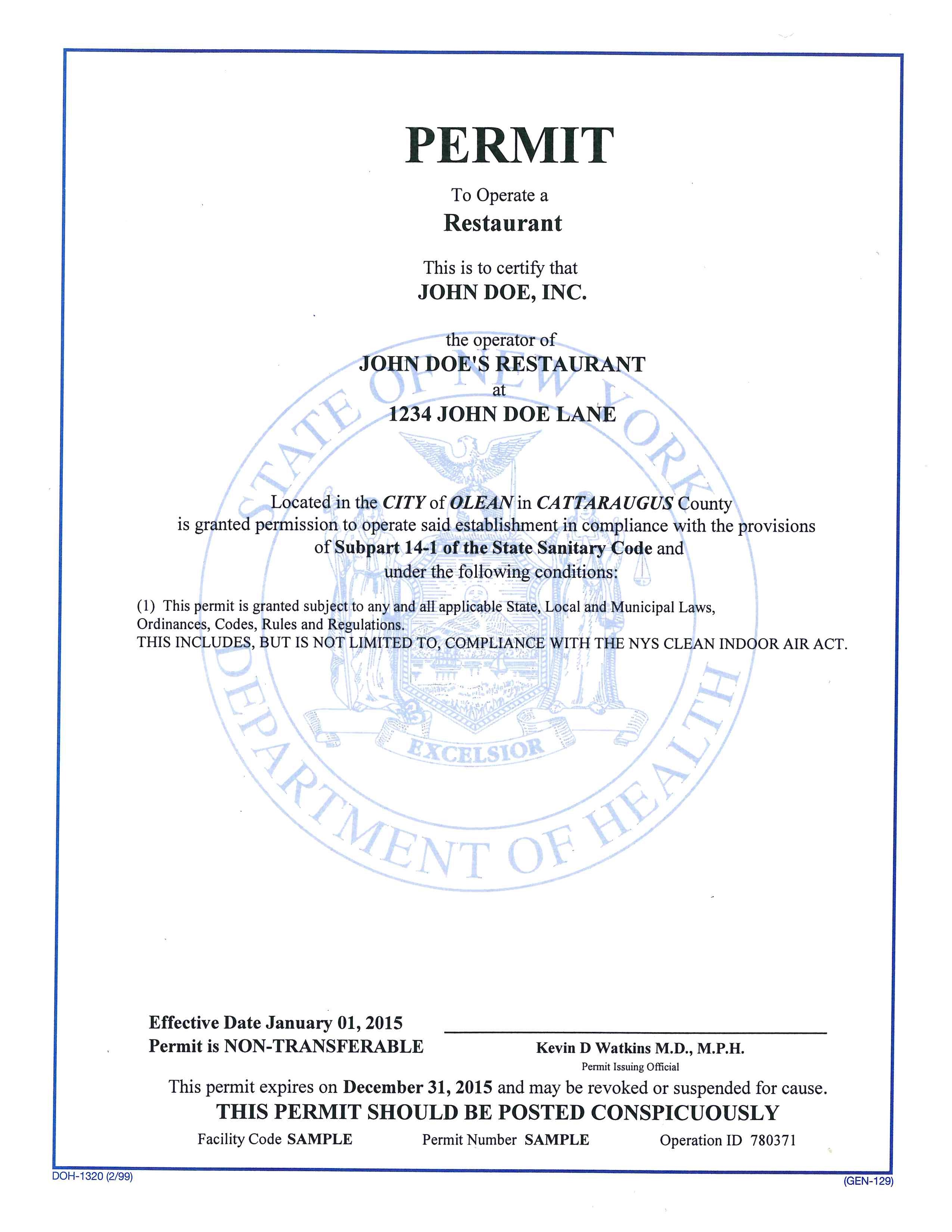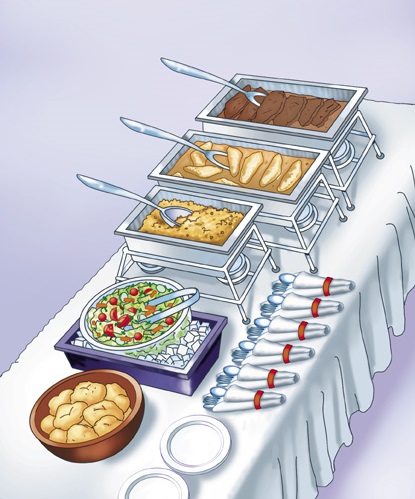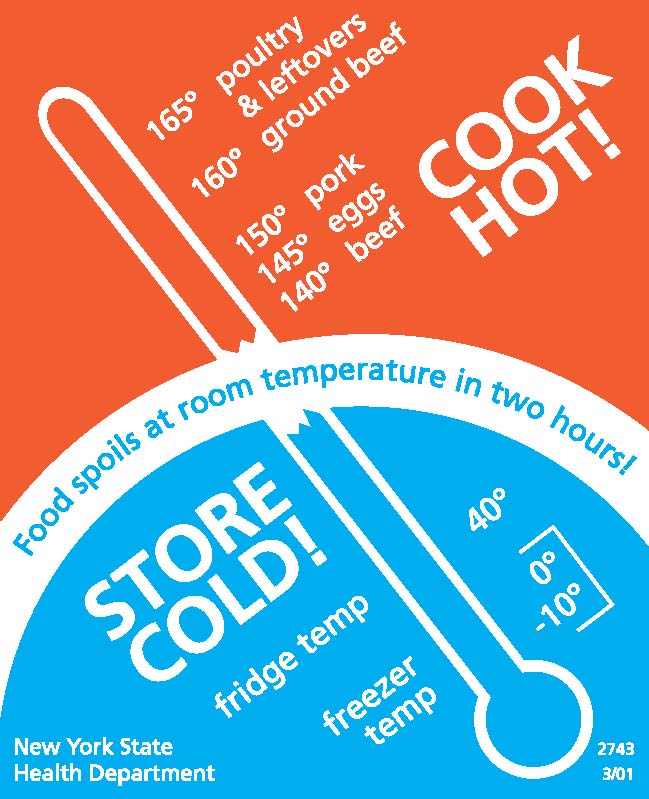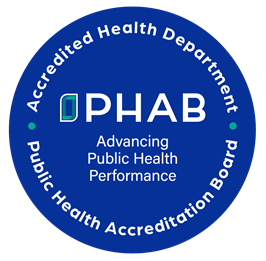
Any operation preparing, handling, and serving food directly to the general public requires a permit issued by the Health Department. Other types of food handling operations that do not serve food directly to the public may require different licenses from other agencies.
Permits for most types of food service operations can be applied for using the generic Health Department "Permit to Operate" form. Applicants seeking a temporary food service permit for special events must use the custom form. It is strongly recommended that you submit your permit application at least thirty (30) days prior to your intended opening date to avoid delays.
Application & Information for a Health Department "Permit to Operate"
Application & Information for a Temporary Food Service Permit
Religious, fraternal and charitable organizations may alternatively receive a "Permission to Operate" which allows limited food service on site no more than once a week. If you represent one of these organizations, please contact us for more information.
Food Service Establishments
A food service establishment is defined as a place where food is prepared and intended for individual portion service, whether consumption occurs on or off the premises (ex. take-out restaurants). These types of food service operations are regulated under Subpart 14-1: Food Service Establishments.
Each food service establishment is placed into one of three "risk classifications" based on the type of foods being served and complexity of preparation. Permit fees and inspection frequency are determined by this risk classification. A "low risk" establishment serves primarily pre-cooked and no-cook foods requiring little preparation. A "medium risk" establishment serves "cook and serve" type foods requiring limited preparation. A "high risk" establishment serves foods requiring more complicated preparation including multiple heating and cooling steps.
Mobile Food Service & Foodcarts
A mobile food service establishment is a self-contained food operation located in a vehicle or movable stand used to store, prepare, display and serve food intended for individual portion consumption. These types of food service operations are regulated under Subpart 14-4: Mobile Food Service Establishments & Foodcarts.
Like permanent food service establishments, mobile food service operations are also placed into one of the three risk classifications mentioned above. Food may be prepared in the unit itself, at an approved food service establishment (or commissary), or purchased at an appropriately licensed facility.

Catering
A caterer is a person who prepares and furnishes food intended for individual portion service at the premises of the consumer (conferences, banquets, etc.). These types of food service operations are regulated under Subpart 14-1: Food Service Establishments.
Caterers must obtain a "Food Service Establishment" permit for their commissary (home facility) with a catering add-on to allow service off site. All catering operations are consider "high risk" food service establishments due to the potential for food to be prepared at one site and transported to another.
Temporary Food Service Establishments
Temporary food service establishments are temporary stands where food is prepared, handled and served to the public that operates at a fixed location in conjunction with a single event not more than 14 consecutive days duration. Typically, foods will have limited preparation (seasoning and cooking only) and will be promptly served and consumed by the public. These types of food service operations are regulated under Subpart 14-2: Temporary Food Service Establishments.
This kind of food service is inherently high risk because of the volume of food served and limited facilities. Advanced planning and preparation is critical to ensure safe handling practices. It is highly recommended that your operation be kept as simple as possible. Depending on the type of food and the facilities available, you may need to alter your plans in order to comply with Sanitary Code requirements. Please note that all food must either be prepared entirely on site, or obtained from an appropriately permitted or licensed facility (restaurant, grocery store, or other retail food establishment).
To apply for a temporary food service permit, you must use the custom application.
Food Handling Practices

Proper food handling practices are essential in ensuring a safe dining experience. Foodborne bacteria and viruses that cause illness are not visible to the naked eye and cannot be detected directly without expensive testing methods. Therefore, food must be well protected from contamination sources and cooking/holding temperature guidelines must be strictly followed in order to protect your diners. This is particularly important for public food service because of the large number of people served and the unknown health status of patrons. Some people (particularly the very young, elderly and immune-compromised) may be more susceptible to foodborne illness than others.
Minimum safety standards for food service operations are established in the NYS Sanitary Code. These standards were developed to ensure that all members of the public, including the more vulnerable populations, can eat out without fear of illness. Depending on the type of your food service permit (see above), different sections of the NYS Sanitary Code will apply.
NYS Sanitary Code - Subpart 14-1: Food Service Establishments
NYS Sanitary Code - Subpart 14-4: Mobile Food Service Establishments & Foodcarts
NYS Sanitary Code - Subpart 14-2: Temporary Food Service Establishments
Understanding and following these safety standards is the responsibility of the food service operator. You are expected to know the code that applies to your operation and develop a business plan that ensures the minimum requirements will be met before you apply for a permit. Failure to understand these requirements may result in permit delays, being cited violations during inspections and potentially discarded products, monetary fines or closure.
Mandatory Food Protection Manager Training
As of September 2017, most food service establishments must demonstrate that they have at least one supervisor/manager on staff who has completed an approved Certified Food Protection Manager training course. This training must be completed through an accredited program meeting ANSI Conference for Food Protection standards.
This requirement applies to all medium-risk and high-risk food service establishments, mobile food service establishments, caterers, and temporary food service operators who serve medium-risk and high-risk foods.
Board of Health Ordinance - Certified Food Protection Manager Training Verification
Certified Food Protection Manager FAQs
Inspections
Every permitted food service operation in Cattaraugus County receives routine inspections by our department to determine compliance with Sanitary Code requirements. These inspections are conducted at different frequencies depending on the type of permit. Inspection visits are unannounced and may be conducted at any time during operation. NOTE: Permit and inspection data is public information and may be obtained by anyone upon request.
The New York State Department of Health maintains a statewide database of this information that is available for viewing in many formats and for download. A link to an interactive map of food service establishments across New York State with data from their most recent inspection can be found below. The same data can be found in tabular form on our website.
Health Data NY - Food Service Establishment Interactive Map
Cattaraugus County - Food Service Inspection Results
New Food Service Establishments
There are many Sanitary Code requirements pertaining to the physical construction of the establishment, as well as the type of equipment allowed for commercial use. Your facility must meet all of the applicable code requirements in order to obtain a permit to operate. A pre-operational inspection is required to ensure that your facility complies with the current code before your permit will be issued.
Please note that any facilities that will be used for your food service operation must be reserved exclusively for this purpose. Home kitchens are not acceptable for use. Any food service facilities in mixed-use buildings must be completely separated from other areas by partitioning and solid self-closing doors. Once a permit is issued, access for inspection must be permitted to any parts of the premises associated with the food service operation during normal business hours.
Additional Requirements for Food Service Establishments with On-Site Utilities
Any water supply used by a food service establishment is classified as a public water system and must meet all applicable water supply regulations. Onsite wastewater treatment systems must be adequately sized to meet the needs of the business and may require an additional SPDES permit from the NYS Department of Environmental Conservation. New wastewater treatment for food service establishments will require the services of a NYS licensed engineer for design and certification. View a fact sheet concerning these requirements.
Plan Review & Approval of Food Service Establishments
Plan review and approval of food service establishments is required for all new construction and extensive remodeling of existing facilities. This process is intended to identify any potential Sanitary Code issues early on so that they may be addressed prior to construction.
If you already have a current food service permit and intend to modify your facility, please contact your inspector to find out if a plan review is necessary.
Other Types of Food Handling Operations
Food handling operations that do not prepare and serve food directly to the consumer do not qualify for a Health Department permit. Most of these operations (retail food stores, food processing & handling facilities, food distribution operations) must obtain a license from the NYS Department of Agriculture and Markets. Specific types of food handling, like slaughtering operations, may require a license from the USDA Food Safety & Inspection Service.
Please contact us if your business will do both public food service and other types of food handling (ex. convenience stores, bakeries that sell both retail & wholesale, etc.) to find out which permit or license is most appropriate for your operation.


